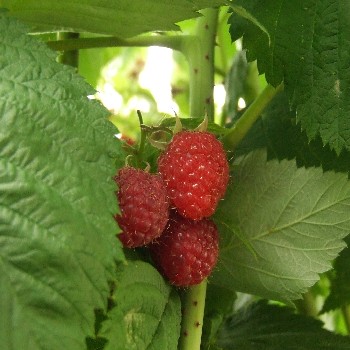 A few hours before my youngest child was born, I sent his older brother to the backyard to pick some leaves off the raspberry canes. Then I put a handful of leaves in a tea strainer, poured boiling water over them, let the whole thing sit for a few minutes, took out the strainer and drank the infusion I’d made. This was something I’d meant to do throughout the pregnancy, or at least as soon as there were fresh raspberry leaves, because I’d read that it was a natural way to prepare the uterus and make labor shorter and easier. But between all the hassles of pregnancy and just plain not feeling like drinking something that tasted like boiled leaves, I hadn’t gotten around to it till I knew I was in labor.
A few hours before my youngest child was born, I sent his older brother to the backyard to pick some leaves off the raspberry canes. Then I put a handful of leaves in a tea strainer, poured boiling water over them, let the whole thing sit for a few minutes, took out the strainer and drank the infusion I’d made. This was something I’d meant to do throughout the pregnancy, or at least as soon as there were fresh raspberry leaves, because I’d read that it was a natural way to prepare the uterus and make labor shorter and easier. But between all the hassles of pregnancy and just plain not feeling like drinking something that tasted like boiled leaves, I hadn’t gotten around to it till I knew I was in labor.
I was scheduled for an induction that day — I didn’t think they’d go through with it, since I’d started labor on my own, but they did. So, on top of whatever effect the raspberry leaf tea was having, I got a dose of Pitocin, an oxytocic — a drug that stimulates labor. The baby was born before the doctor could get to the hospital. (The nurses delivered him just fine, thank you, and anyway, as I knew from experience, it was up to me to do most of the work.) I always figured there was no way to tell how much of that was due to the Pitocin and how much to the raspberry tea.
Some researchers in Australia were also wondering if the folk wisdom about raspberry tea was right, and a few years after my experience they did a study on it. Unlike me, the women in the study hadn’t given birth before, and they got their raspberry leaf in tablet form, which must’ve tasted better. The researchers didn’t start them on it till the 32nd week of pregnancy.
Fortunately, the raspberry tablets had no adverse effects on the mothers or their babies. Disappointingly, they didn’t shorten the first stage of labor (compared to the control group). But the women who took them did have shorter second stage labors than the control group — on average, about 10 minutes shorter, and that seems like a lot of time when you’re in labor.
You can draw your own conclusions — if you want to take raspberry leaf during pregnancy, it most likely won’t hurt, and it may spare you a few minutes of second-stage labor.











Hi,
I just wanted to say that with our first baby born in 2011 it was roughly 12 hrs of labor but only half of that was painful. I had about 20 minutes of pushing her out and she came right out. The first half started with my water slowly breaking in the morning and pretty much no pain or discomfort. It wasn’t until I had been adjusted one last time by my Chiro that the contractions really took off into active labor and she was born a few hours later. I took red raspberry leaf tea and caps almost my whole pregnancy. I mostly took caps in the last trimester and really upped the amount as I was rather paranoid about labor. 🙂 it worked very well and my after cramping was barely there when my uterus was going back to normal. I contribute my relatively quick second stage of labor to be rrl and the adjustments made by my Chiro during my third trimester. Also it is very good to start rrl when you find out you are pregnant because it can help prevent miscarriage as it is a wonderful herb for lessening bleeding and cramping. Better to start it ASAP so to help the pregnancy and baby be strong and healthy and he delivery be as smooth and quick as possible. Thanks
Thanks for sharing your experience, Melody. It looks like the scientists agree with you about shortening the second stage of labor. I don’t know if I could’ve found raspberry leaf capsules back then (16 years ago), but it’s good to know they’re available now.